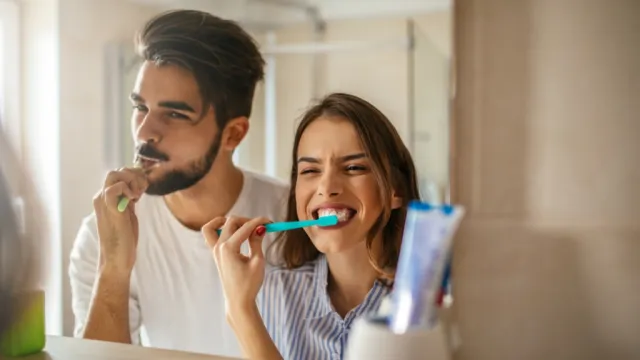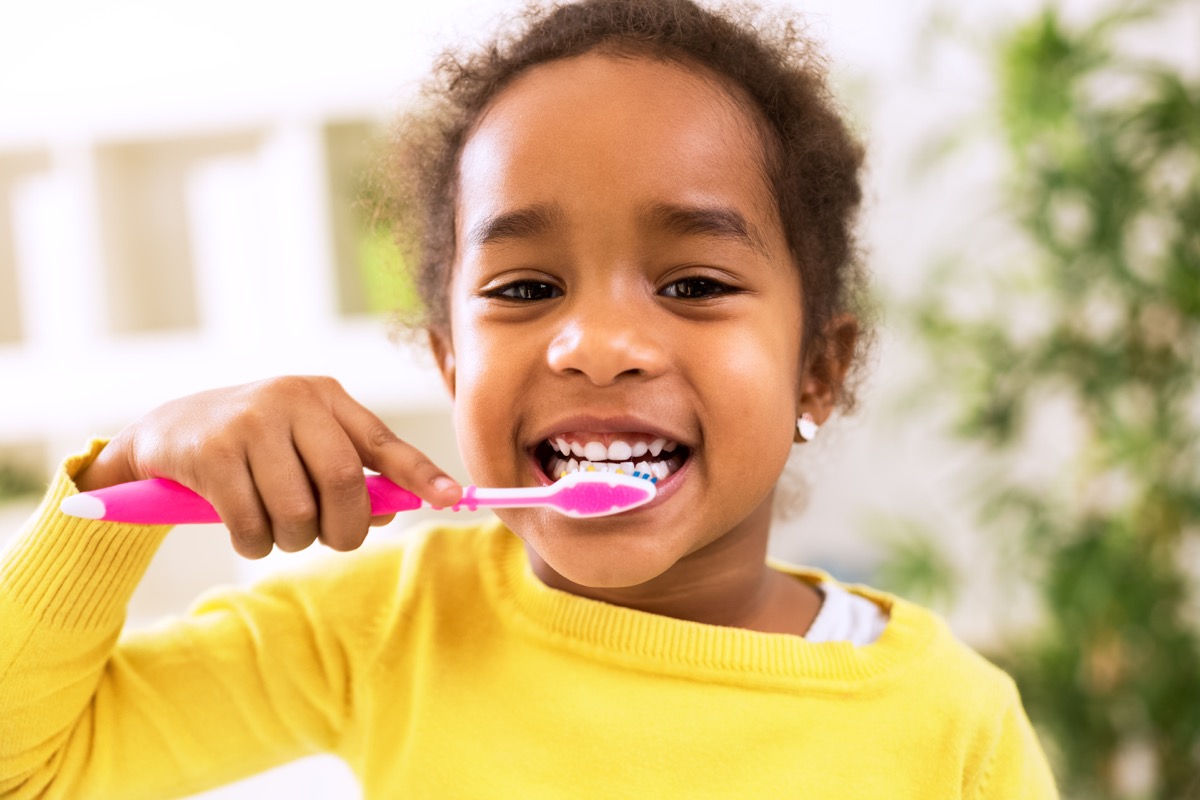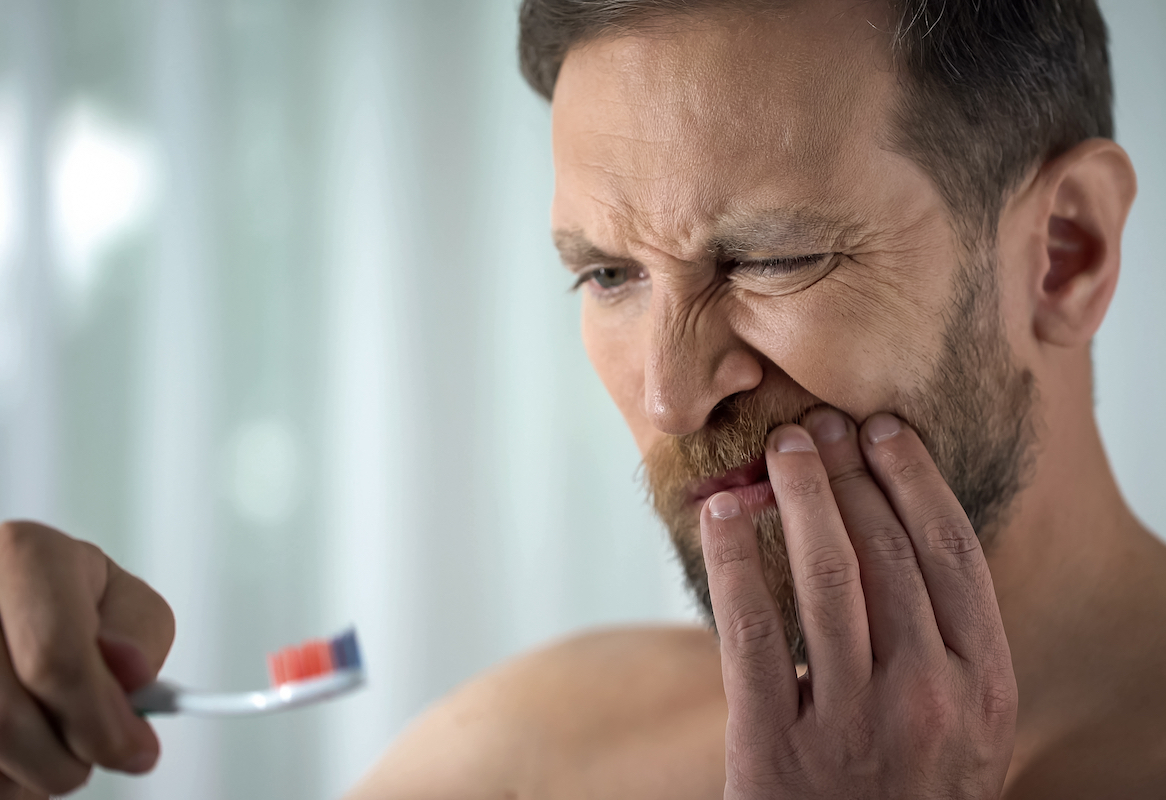Your Gum Disease Risk Soars If You Brush Your Teeth Like This, Experts Warn

Gum disease—also known as periodontitis—can lead to an unpleasant set of oral symptoms, including bad breath, tooth pain, loose teeth, receding gums, tooth loss, and more. But perhaps even more importantly, gum disease can contribute to a range of broader health problems, warns the Mayo Clinic. “The bacteria responsible for periodontitis can enter your bloodstream through gum tissue, possibly affecting other parts of your body. For example, periodontitis is linked with respiratory disease, rheumatoid arthritis, coronary artery disease, and problems controlling blood sugar in diabetes,” says the Mayo Clinic site.
That’s why dental experts are urging the public to take a second look at how we brush our teeth. They say that by not doing this one simple thing, your risk of gum disease skyrockets over time. Read on to learn the simple brushing hack that dentists say can transform your oral and overall health.
RELATED: This Is the Absolute Worst Time to Brush Your Teeth, Dentists Say.
If you don’t brush at a 45 degree angle, you’re at a higher risk of gum disease.

Brushing may seem simple, but experts warn that far too many of us are missing the mark when it comes to performing this everyday health habit. “When learning to brush our teeth at a young age, few people are told anything about using the proper toothbrush angle,” say experts from San Pablo Smiles Family Dentistry, via their site. “Your toothbrush should be aimed at 45 degrees inside your mouth as you brush your teeth. The reason for this specific angle is so that the toothbrush can more effectively clean your gum line. If your gums aren’t properly cleaned each day, it can lead to gum infections or diseases,” their dental experts add.
RELATED: If You’re Over 65, Never Do This In the Bathroom, Doctors Warn.
You should brush twice per day, for a minimum of two minutes.

Besides brushing at the wrong angle, most Americans also fail to brush for a long enough period of time, says a 2009 study published in The Journal of Dental Hygiene (JDH). Though the average person brushes for just 45 seconds, the researchers advised that people should brush their teeth for a minimum of two minutes, though brushing for three minutes has even greater benefits.
“Plaque removal increased with brushing time across the range studied, tending towards a maximum at longer brushing times,” wrote experts from the American Dental Hygienists Association (ADHA), the group behind the study. “At the extremes, brushing for 180 seconds removed 55 percent more plaque than brushing for 30 seconds. Brushing for 120 seconds removed 26 percent more plaque than brushing for 45 seconds,” they added.
You should brush in “short, circular strokes.”

The motion of your brushing is also important, says the San Pablo Smiles team. “We see it all the time, especially in kids, but brushing left to right along your teeth is not a good idea. In fact, this technique can even cause damage. When cleaning teeth, you need to have a mindset where you’re massaging and not scrubbing your teeth,” they explain. “Instead, start from the gum line and brush in little circular motions, up and down the teeth. It is important to brush gently but thoroughly,” their experts add.
For more health news sent directly to your inbox, sign up for our daily newsletter.
Use only soft-bristled toothbrushes.

Using a soft-bristled toothbrush can help ensure that your teeth are protected while you follow your new brushing routine. “Dental professionals recommend soft-bristle toothbrushes because too much pressure or overzealous brushing can negatively impact the enamel and gums. The American Dental Association (ADA) recommends soft-bristle toothbrushes with angled or multi-layer bristles to ensure an excellent clean without harming your teeth,” explain dental experts on behalf of the toothpaste company Colgate.
“You should choose the type of toothbrush that will be easy and comfortable to use at least twice a day. There are many different options between manual and electric toothbrushes,” the Colgate site further explains. “However, dentists’ consensus is to choose soft-bristled toothbrushes, especially if you tend to push harder against your teeth. More pressure does not equal cleaner teeth, and in fact, can cause gum loss, which can contribute to tooth sensitivity. It may start to damage the enamel and tissues around your teeth,” they add.
RELATED: The One Body Part You Shouldn’t Wash in the Shower, Doctors Say.